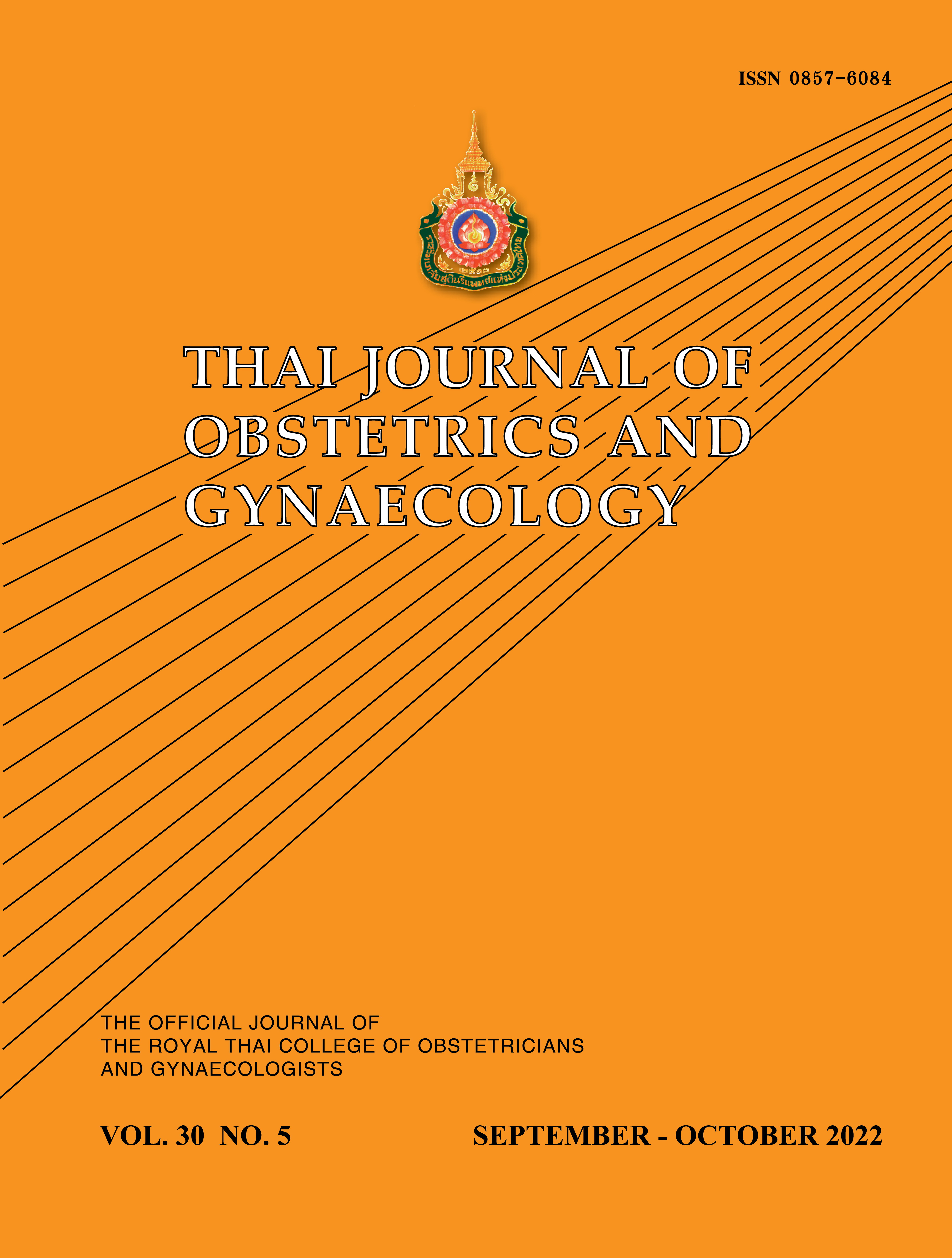Preconception Care for Obese Women
Main Article Content
Abstract
Obese women increase adverse pregnancy outcomes when they get pregnant. Preconception care for obese women should be provided in order to plan for favorable pregnancy outcomes. The topics of preconception care include past history, personal history, family history, obstetric and gynecological history, and health promotion. Obese women should lose weight by 5-10%, have adequate exercise and have adequate nutrition especially folic acid before pregnancy. When pregnant, obese women should have appropriate weight gain.
Article Details

This work is licensed under a Creative Commons Attribution-NonCommercial-NoDerivatives 4.0 International License.
References
Meeting to develop a global consensus on preconception care to reduce maternal and childhood mortality and morbidity. Geneva: World Health Organization; 2013.
Obesity: preventing and managing the global epidemic. Report of a WHO consultation. World Health Organ Tech Rep Ser 2000;894:1-253.
Obstetric and gynecology statistical report 2016-2021. Department of Obstetrics and Gynecology, Faculty of Medicine, Chulalongkorn University
ACOG Committee Opinion No. 736: Optimizing Postpartum Care. Obstet Gynecol 2018;131:e140-e50.
Cunningham FG, Lenovo KJ, Bloom SL, Dashe JS, Hoffman BL, Casey BM, et al., editors. Williams obstetrics. 26th ed. New York: McGraw Hill; 2022.
Skogsdal YRE, Karlsson JA, Cao Y, Fadl HE, Tyden TA. Contraceptive use and reproductive intentions among women requesting contraceptive counseling. Acta Obstet Gynecol Scand 2018;97:1349-57.
www.cd.gov/preconception/careforwomen/index.html
Delcore L, Lacoursiere DY. Preconception Care of the Obese Woman. Clin Obstet Gynecol 2016;59:129-39.
Jack BW, Atrash H, Coonrod DV, Moos MK, O'Donnell J, Johnson K. The clinical content of preconception care: an overview and preparation of this supplement. Am J Obstet Gynecol 2008;199:S266-79.
ACOG Practice Bulletin No. 201 Summary: Pregestational diabetes mellitus. Obstet Gynecol 2018;132:1514-6.
American Diabetes A. Preconception care of women with diabetes. Diabetes Care 2004;27 Suppl 1:S76-8.
Hinkle SN, Tsai MY, Rawal S, Albert PS, Zhang C. HbA1c Measured in the First Trimester of Pregnancy and the Association with Gestational Diabetes. Sci Rep 2018;8:12249.
Yamamoto JM, Hughes DJF, Evans ML, Karunakaran V, Clark JDA, Morrish NJ, et al. Community-based pre-pregnancy care programme improves pregnancy preparation in women with pregestational diabetes. Diabetologia 2018;61:1528-37.
Tripathi A, Rankin J, Aarvold J, Chandler C, Bell R. Preconception counseling in women with diabetes: a population-based study in the north of England. Diabetes Care 2010;33:586-8.
COVID-19 vaccines while pregnant or breastfeeding. www.cdc.gov/coronavirus/2019-ncov/vaccines/recommendations/pregnancy.html
ACOG practice bulletin no. 105: bariatric surgery and pregnancy. Obstet Gynecol 2009;113:1405-13.
Johansson K, Stephansson O, Neovius M. Outcomes of pregnancy after bariatric surgery. N Engl J Med 2015;372:2267.
Yi XY, Li QF, Zhang J, Wang ZH. A meta-analysis of maternal and fetal outcomes of pregnancy after bariatric surgery. Int J Gynaecol Obstet 2015;130:3-9.
Phupong V. Prenatal diagnoses: reason for, technique and iIssue. In: Pereira E, Soria J, editors. Handbook of Prenatal Diagnosis: Methods, Issues and Health Impacts. New York: Nova science publisher; 2010. p. 63-93.
Prevention of neural tube defects: results of the Medical Research Council Vitamin Study. MRC Vitamin Study Research Group. Lancet 1991;338:131-7.
Czeizel AE, Dudas I. Prevention of the first occurrence of neural-tube defects by periconceptional vitamin supplementation. N Engl J Med 1992;327:1832-5.
ACOG Practice Bulletin No 156: Obesity in Pregnancy. Obstet Gynecol 2015;126:e112-e26.
Kongubol A, Phupong V. Prepregnancy obesity and the risk of gestational diabetes mellitus. BMC Pregnancy Childbirth 2011;11:59.
Siega-Riz AM, Gray GL. Gestational weight gain recommendations in the context of the obesity epidemic. Nutr Rev 2013;71 Suppl 1:S26-30.
Schummers L, Hutcheon JA, Bodnar LM, Lieberman E, Himes KP. Risk of adverse pregnancy outcomes by prepregnancy body mass index: a population-based study to inform prepregnancy weight loss counseling. Obstet Gynecol 2015;125:133-43.
Stothard KJ, Tennant PW, Bell R, Rankin J. Maternal overweight and obesity and the risk of congenital anomalies: a systematic review and meta-analysis. JAMA 2009;301:636-50.
Cedergren MI. Maternal morbid obesity and the risk of adverse pregnancy outcome. Obstet Gynecol 2004;103:219-24.
LaCoursiere DY, Bloebaum L, Duncan JD, Varner MW. Population-based trends and correlates of maternal overweight and obesity, Utah 1991-2001. Am J Obstet Gynecol 2005;192:832-9.
Insitute of Medicine. Weight gain during pregnancy: reexamining the guidelines 2009.
Troiano RP, Berrigan D, Dodd KW, Masse LC, Tilert T, McDowell M. Physical activity in the United States measured by accelerometer. Med Sci Sports Exerc 2008;40:181-8.
http://www.cdc.gov/physicalactivity/basics/adults/index.htm.
Seneviratne SN, McCowan LM, Cutfield WS, Derraik JG, Hofman PL. Exercise in pregnancies complicated by obesity: achieving benefits and overcoming barriers. Am J Obstet Gynecol 2015;212:442-9.
Rasmussen SA, Chu SY, Kim SY, Schmid CH, Lau J. Maternal obesity and risk of neural tube defects: a metaanalysis. Am J Obstet Gynecol 2008;198: 611-9.
Nawapun K, Phupong V. Awareness of the benefits of folic acid and prevalence of the use of folic acid supplements to prevent neural tube defects among Thai women. Arch Gynecol Obstet 2007;276:53-7.
Mojtabai R. Body mass index and serum folate in childbearing age women. Eur J Epidemiol 2004;19:1029-36.
Centre for Maternal and Child Enquiries/Royal College of Obstetricians and Gynaecologists. Management of Women with Obesity in Pregnancy, 2010. Available at: http://www.rcog.org.uk/globalassets/documents/guidelines/cmacercogjoint guidelinemanagementwomenobesitypregnancya.pdf.


